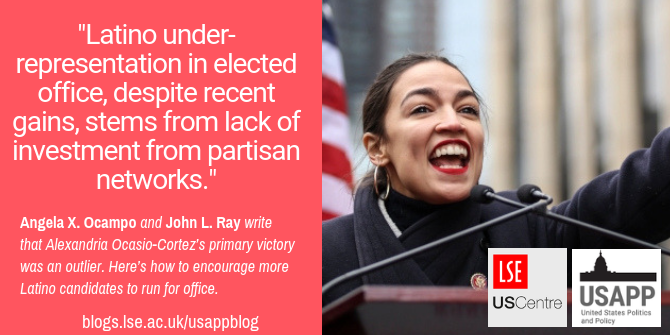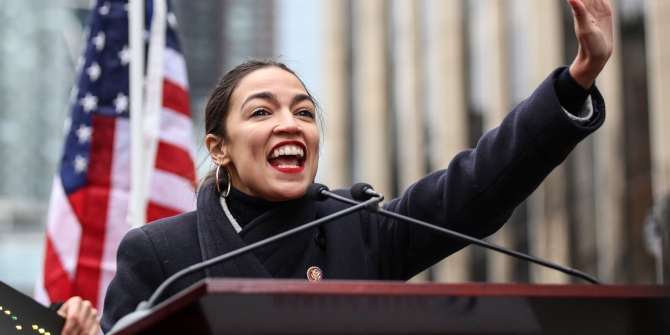
 Ahead of the 2018 midterms, Alexandria Ocasio-Cortez made international headlines by unseating 10-term incumbent Joe Crowley for the Democratic nomination for New York’s 14th US House District. In new research, Angela X. Ocampo and John L. Ray find that Ocasio-Cortez’s example is an unusual one: because of limited party support, Latinos are generally far less likely to run for office if they face strong opposition in primary elections. To overcome this barrier, they write, partisan networks need to invest more in Latino candidates.
Ahead of the 2018 midterms, Alexandria Ocasio-Cortez made international headlines by unseating 10-term incumbent Joe Crowley for the Democratic nomination for New York’s 14th US House District. In new research, Angela X. Ocampo and John L. Ray find that Ocasio-Cortez’s example is an unusual one: because of limited party support, Latinos are generally far less likely to run for office if they face strong opposition in primary elections. To overcome this barrier, they write, partisan networks need to invest more in Latino candidates.
Representative Alexandria Ocasio-Cortez (D-NY), one of the youngest and most junior members of Congress, has quickly gained national popularity and a following among American progressives. The story of her election was detailed in the recent Netflix documentary Knock Down The House, along with the stories of other young progressives. In new research, we investigate some of the phenomena in American politics linked to these stories.
Perhaps what is most notable about Rep. Ocasio-Cortez’s surge is that she did not rise through the ranks of the Democratic Party or hold any prior office before her victory in 2018. In the primary, Rep. Ocasio-Cortez was endorsed by progressive and civil rights groups that largely operate outside of the traditional Democratic Party. She led an insurgent campaign and won against Rep. Joe Crowley, a 10-term legislator with a strong progressive record of his own, and a prestigious chairmanship of the House Democratic Caucus. Rep. Crowley had received support from the most established influencers in Democratic politics including New York Governor Andrew Cuomo, Senator Chuck Schumer (D-NY), Senator Kirsten Gillibrand (D-NY), a long list of US Representatives, over 30 local and national unions, and others. Due, at least partially, to the scope and scale of this conflict, Rep. Ocasio-Cortez’s win made national news, and as some political organizations gleefully point out, such wins by progressives are far from the norm even in wave years like 2018.
What factors lead to more or fewer Latino candidates running for office?
Findings from our research speak to these dynamics. In order to better understand the process of Latino candidate emergence and success we investigated what factors influenced the presence of some candidates over others in local “candidate pools” –that is, the set of likely and viable candidates in a given electoral area – with a specific eye to the role of party elites in this process. To do this, we collected an original dataset of all candidates running for Congress from 2004 to 2014 along with information on their personal characteristics, prior experience and information on the Congressional districts and contests where they were running. We also collected data on “almost-rans”, individuals who publicly considered running for office but ended up not doing so. Finally, we gathered data on elite endorsements. These were endorsements received by the candidates in our data. These endorsements were critical in helping us understand if Latinos and non-Latinos were receiving disproportionate party support and, if that was the case, how this type of support was consequential in their respective elections.
We found that, at the “pre-emergence stage”, that is, the early few months of a cycle or when candidates are still deciding whether or not to enter a race – Latino candidate participation is significantly more sensitive to the presence of potential challengers than are non-Latinos. In other words, we find that when facing a strong electoral challenge, Latinos are less likely to run and join a pool of candidates than others. We posit that this happens because Latinos anticipate not being able to mount a successfully large campaign to beat their challenger due to limited party support.
To test this assertion, we look at the extent to which Latinos and non-Latinos receive differential support by their respective party organizations and sitting legislators, who are some of the most influential players in partisan networks. Our results showed that Latino candidates who compete in primary elections, compared to non-Latino candidates, are under-supported by their home party in the general election, as measured by support from sitting legislators. As our sample focuses on open-seat races, we argue this discrepancy in support cannot be explained by the traditional deference to given to incumbents.

“Women’s March on NYC 2019” by Dimitri Rodriguez is licensed under CC BY 2.0
The importance of party support for Latino candidates
But is limited party support consequential? Our research indicates that it is. We find that the greater number of endorsements that a candidate receives the greater their vote share is, even after accounting for candidate characteristics and district-specific factors. As important as partisan elite support is, we found that Latino candidates are not receiving it. As a result, Latino candidates are strategic and decide to not declare candidacy if they perceive a strong primary contender and lack of support from partisan networks.
Several implications stem from our findings. More Latinos would be willing to run for office if they were not deterred by the prospect of high-quality challengers, who are clearly more numerous in “safe districts” long occupied by either party. To get more Latinos to run, would-be Latino candidates would have to perceive a clear path to victory, as signaled by actual support from partisan networks that would allow them to defeat strong challengers.
As such, our findings are connected to a larger and daunting paradox. Prior research indicates that new groups seeking a “seat at the table” of a major party have the best chance of entry by contesting primaries in districts safe for the party in the general election. For example, Christian conservatives began their takeover of the Republican Party through primaries and “sleepy local GOP offices” of the South and Midwest, and Civil Rights activists worked their way into an intolerant Democratic party that only reluctantly welcomed them initially. Yet it is in those districts where party establishments are the strongest. Thus, in those districts, the “candidate pipeline” is already full, political elites have well-established preferences, and so it is harder for new groups to enter at all.
The rise of Rep. Ocasio Cortez in the periphery of the Democratic Party as well as the emergence of organizations such as Latino Victory Project and Run for Something, dedicated to recruiting and supporting women, young people and people of color to run for office, suggest that the traditional partisan networks are not doing enough to incorporate America’s next generation of political leaders and new groups.
More investment in Latino candidates needed from partisan networks
While Latino candidates are more likely to emerge in Democratic districts than Republican ones, our work finds that a similar dynamic applies for both parties. Moreover, although our sample is based on Congressional candidates, the theory is informed by political contestation at all levels. The rise of political stars like Julián and Joaquin Castro is a story of working their way into their respective parts of the Texas Democratic establishment “instead of just having to pound on the damn door to have someone hear you.” Both brothers report learning this lesson from their mother Rosie Castro, an activist with La Raza Unida, one of the most important groups in Texas politics that, for much of its history, worked outside traditional party organizations. The still too-close-to-call election for District Attorney in Queens, highlighted by the insurgency of Tiffany Cabán, as well as the primary victory of Lumarie Maldonado Cruz for Queens Civil Court Judge, are more recent examples of new Latina candidates facing uphill battles against mature party organizations.
Our research suggests that Latino under-representation in elected office, despite recent gains, stems from lack of investment from partisan networks. When apparent underrepresentation occurs, political contestation is often a result. The new resistance groups that have emerged in the past few cycles on the Democratic side speak to this dynamic. Successful entry into a party network requires ongoing efforts to ensure that there is equal level of support for the entrants and that such support is apparent to new candidates as they consider running for office. If partisan networks invested more in Latino candidates perhaps our institutions would more appropriately represent the present-day demographic make-up of the nation.
- This article is based on the paper, ‘Many are called but few are chosen: the emergence of Latino congressional candidates’ in Politics, Groups, and Identities.
Please read our comments policy before commenting.
Note: This article gives the views of the author, and not the position of USAPP – American Politics and Policy, nor the London School of Economics.
Shortened URL for this post: http://bit.ly/2XZEywU
About the author
 Angela X. Ocampo – University of Michigan
Angela X. Ocampo – University of Michigan
Angela X. Ocampo is an LSA Collegiate Fellow at the University of Michigan, where she will be Assistant Professor of Political Science starting in Fall of 2020. Her research and teaching interests focus on American politics, political behavior, representation, race and ethnic politics and quantitative methodology.
 John L. Ray – University of California, Los Angeles
John L. Ray – University of California, Los Angeles
John Ray is a PhD Candidate in the Department of Political Science, at the University of California-Los Angeles.



